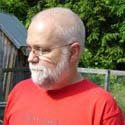"Distinguishable, not separable." I'll accept that, but Mars remains red in the sense that human eyes perceive the light coming from that object in a certain way & humans have a name for that sensation; if the name for the color were blue, the situation wouldn't really be any different, only the label would have changed, not the underlying reality. (Christ! I know that is a term fraught with problems, but, in the Wittgensteinian sense, you know what I mean!) I accept Wittgenstein's critique of the Positivist word/object relation. Dogs, however, bereft of language, can identify colors & certainly can form opinions about objects. What if we say that human beings organize their perceptions of the world in language? Such a statement avoids the vortex of idealism without insisting that we know exactly what produces our perceptions--of color or anything else.
Philosophical Investigations
Christopher Robinson & Joseph Duemer read Wittgenstein's Philosophical Investigations
8.27.2002
8.25.2002
[58] "It looks to us as if we were saying something about the nature of red in saying that the words 'Red exists' do not yield a sense. Namely that red does exist 'in its own right'. The same idea--that this is a metaphysical statement about red--finds expression again when we say such a thing as that red is timeless, and perhaps more strongly in the word 'indestructible'."
The question here is in what sense does red exist. Is red a quality of things or is it an aspect of description? What does it mean to say "Mars is red"? We're pretty sure--given our instruments & our mathematics--that Mars itself exists, so what might be the problem in asserting that "Mars is the red planet"? Wittgenstein seems to suggest that the red to which we refer is . . . linguistic in nature, but how can that be? Mars is red: on a night when the planet is visible I can go outside & determine this fact for myself.
One of the interesting things about a collaborative weblog is the way it maintains inertia. I might have stopped reading PI at about remark 50 had I not been embarked upon this project; after all, I have by this point in the text developed an exquisite sense of Wittgenstein's obdurate & implacable approach to philosophy. Wittgenstein is the proponent of the philosophical high colonic & so what can be expected in the next three hundred remarks but more cleansing? The answer is, I don't know & this particular project constrains me to find out. By the time this is over I'm going to have the cleanest (philosophical) colon in creation!
8.14.2002
We appear to be on a brief summer hiatus, taking a breather from the heavy lifting. Cooler weather will bring us back indoors.
8.06.2002
Here is what looks to be an amazing resource on color. Could perhaps be useful as we think more about W's analysis of color & color-naming & color-remembering.
I started blogging about ten months ago & we began this blog a little while after that; up to last week, I've always had something to say. Maybe it was the heat, maybe just a late summer malaise brought on by the state of the American government . . . who knows? But rather than post something merely to be posting it, I've held back. This morning, though, I feel a bit more confident of my abilities to write something that's at least coherent. (Actually, part of the blogging block was the realization that I had an audience. For an American poet, this can be a strange sensation. I began the reading & writing weblog literally as a reading journal; the fact that it was written in a public space had the virtue of making me think through what I wrote, but beyond that I had no sense of my readers so I wrote spontaneously. Lately, I find links to my blog & occasionally someone quoting me on another weblog--things that bloggers are supposed to live for--but honestly I find it a little disorienting. Even though I believe that real writers write for an audience, I want to avoid getting caught up in opinion-mongering & get back to reading & writing.) Don't you love it when the parenthesis is longer than the statement?
Your description of seeing Sartre "gesture" struck a chord with me. When I was in my early 20s I fell in love with the late poems of William Carlos Williams. I would read them over to myself both silently & out loud just for the feel of the language. During my first semester in graduate school the poet Donald Justice played our seminar a tape of Williams reading that had been recorded late in his life, after he'd had at least one stroke. Hearing WCW's old man's voice, hesitation, stumbling, raw profoundly changed the way I read the poems. But should it? Do the poems need the voice? No, I don't think they do & if they did they would be mere performance pieces; still, every reader reads a slightly different poem, bringing to the reading an entire world of personal experience, including perhaps the experience of seeing or hearing the author of the words they have studied. Such experience certainly can't be excluded.
I like what you said about the death of the author. It's a notion I grasp & even find occasionally useful intellectually, but as a writer myself it's hard for me to accept in any deep sense: I like myself too much!

